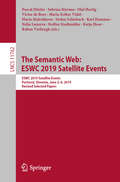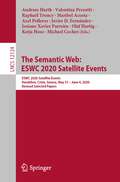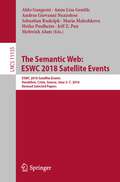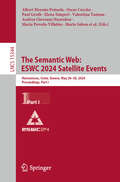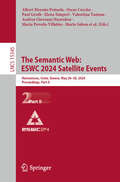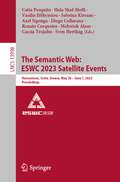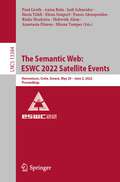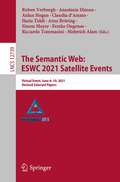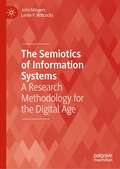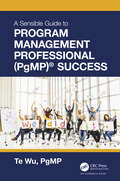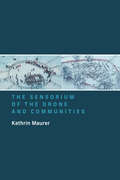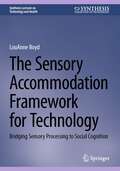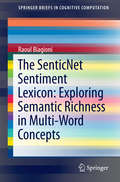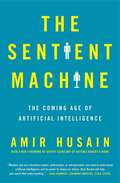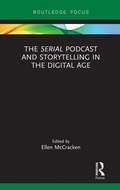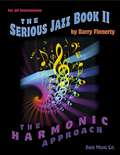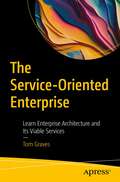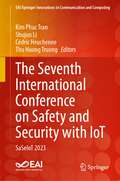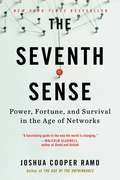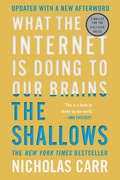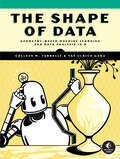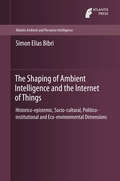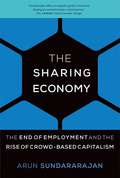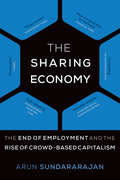- Table View
- List View
The Semantic Web: ESWC 2019 Satellite Events, Portorož, Slovenia, June 2–6, 2019, Revised Selected Papers (Lecture Notes in Computer Science #11762)
by Ruben Verborgh Maria-Esther Vidal Stefan Schlobach Pascal Hitzler Olaf Hartig Katja Hose Maria Maleshkova Karl Hammar Sabrina Kirrane Victor De Boer Nelia Lasierra Steffen StadtmüllerThis book constitutes the thoroughly refereed post-conference proceedings of the Satellite Events of the 16th Extended Semantic Web Conference, ESWC 2019, held in Portorož, Slovenia, in June 2019.The volume contains 38 poster and demonstration papers, 2 workshop papers,5 PhD symposium papers, and 3 industry track papers, selected out of a total of 68 submissions. They deal with all areas of semantic web research, semantic technologies on the Web and Linked Data.
The Semantic Web: ESWC 2020 Satellite Events, Heraklion, Crete, Greece, May 31 – June 4, 2020, Revised Selected Papers (Lecture Notes in Computer Science #12124)
by Valentina Presutti Raphaël Troncy Olaf Hartig Katja Hose Maribel Acosta Andreas Harth Michael Cochez Axel Polleres Javier D. Fernández Josiane Xavier ParreiraThis book constitutes the proceedings of the satellite events held at the 17th Extended Semantic Web Conference, ESWC 2020, in May/June 2020. The conference was planned to take place in Heraklion, Crete, Greece, but changed to an online format due to the COVID-19 pandemic. ESWC is a major venue for presenting and discussing the latest scientific results and technology innovations related to the Semantic Web, Linked Data and Knowledge Graphs. The 36 poster and demo papers, 7 PhD symposium papers, and 4 industry track papers, included in this volume were carefully reviewed and selected from 59 submissions to the poster and demo track; 11 submissions to the PhD symposium track, and 5 submissions to the Industry track.
The Semantic Web: Eswc 2018 Satellite Events, Heraklion, Crete, Greece, June 3-7, 2018, Revised Selected Papers (Lecture Notes in Computer Science #11155)
by Heiko Paulheim Sebastian Rudolph Aldo Gangemi Mehwish Alam Anna Lisa Gentile Andrea Giovanni Nuzzolese Maria Maleshkova Jeff Z PanThis book constitutes the thoroughly refereed post-conference proceedings of the Satellite Events of the 15th Extended Semantic Web Conference, ESWC 2018, held in Heraklion, Crete, Greece, in June 2018.The volume contains 41 poster and demonstration papers, 11 invited workshop papers, and 9 full papers, selected out of a total of 70 submissions. They deal with all areas of semantic web research, semantic technologies on the Web and Linked Data.
The Semantic Web: Hersonissos, Crete, Greece, May 26–30, 2024, Proceedings, Part I (Lecture Notes in Computer Science #15344)
by Paul Groth Oscar Corcho Valentina Tamma Valentina Presutti Elena Simperl Marta Sabou Andrea Giovanni Nuzzolese Irene Celino Pasquale Lisena Albert Meroño Peñuela Maria Poveda-Villalón Artem Revenko Joe Raad Bruno SartiniThis two volume set constitutes the refereed proceedings of the International Conference, ESWC 2024 Satellite Events, held in Hersonissos, Crete, Greece during May 26–30, 2024. The 67 papers presented were carefully reviewed and selected from 128 submissions. This year conference aimed at acknowledging recent developments in AI with a special tagline, “Fabrics of Knowledge: Knowledge Graphs and Generative AI”. To reflect this year’s special topic, the satellite events of ESWC 2024 featured a Special Track on Large Language Models for Knowledge Engineering, in addition to the poster and demo session, the PhD symposium, the industry track, project networking, and workshops and tutorials.
The Semantic Web: Hersonissos, Crete, Greece, May 26–30, 2024, Proceedings, Part II (Lecture Notes in Computer Science #15345)
by Paul Groth Oscar Corcho Valentina Tamma Valentina Presutti Elena Simperl Marta Sabou Andrea Giovanni Nuzzolese Irene Celino Pasquale Lisena Albert Meroño Peñuela Maria Poveda-Villalón Artem Revenko Joe Raad Bruno SartiniThis two volume set constitutes the refereed proceedings of the International Conference, ESWC 2024 Satellite Events, held in Hersonissos, Crete, Greece during May 26–30, 2024. The 67 papers presented were carefully reviewed and selected from 128 submissions. This year conference aimed at acknowledging recent developments in AI with a special tagline, “Fabrics of Knowledge: Knowledge Graphs and Generative AI”. To reflect this year’s special topic, the satellite events of ESWC 2024 featured a Special Track on Large Language Models for Knowledge Engineering, in addition to the poster and demo session, the PhD symposium, the industry track, project networking, and workshops and tutorials.
The Semantic Web: Hersonissos, Crete, Greece, May 28 - June 1, 2023, Proceedings (Lecture Notes in Computer Science #13998)
by Mehwish Alam Sabrina Kirrane Vasilis Efthymiou Catia Pesquita Hala Skaf-Molli Renato Cerqueira Sven Hertling Axel Ngonga Diego Collarana Cassia TrojahnThis book constitutes the post-conference proceedings of the satellite events held at the 20th Extended Semantic Web Conference, ESWC 2023, held in Hersonissos, Greece, during May 28—June 1, 2023.The 50 full papers included in this book were carefully reviewed and selected from 109 submissions. They were organized in sections as follows: Posters and Demos, Industry, and PhD Symposium.
The Semantic Web: Hersonissos, Crete, Greece, May 29 – June 2, 2022, Proceedings (Lecture Notes in Computer Science #13384)
by Paul Groth Elena Simperl Rinke Hoekstra Mehwish Alam Anisa Rula Panos Alexopoulos Anastasia Dimou Ilaria Tiddi Jodi Schneider Minna TamperThis book constitutes the proceedings of the satellite events held at the 19th Extended Semantic Web Conference, ESWC 2022, during May—June in Hersonissos, Greece, 2022. The included satellite events are: the poster and demo session; the PhD symposium; industry track; project networking; workshops and tutorials. During ESWC 2022, the following ten workshops took place:10th Linked Data in Architecture and Construction Workshop (LDAC 2022); 5th International Workshop on Geospatial Linked Data (GeoLD 2022); 5th Workshop on Semantic Web solutions for large-scale biomedical data analytics (SeMWeBMeDA 2022); 7th Natural Language Interfaces for the Web of Data (NLIWOD+QALD 2022); International Workshop on Knowledge Graph Generation from Text (Text2KG 2022); 3rd International Workshop on Deep Learning meets Ontologies and Natural Language Processing (DeepOntoNLP 2022); 1st Workshop on Modular Knowledge (ModularK 2022); Third International Workshop On Knowledge Graph Construction (KGCW 2022); Third International Workshop On Semantic Digital Twins (SeDIT 2022); and the 1st International Workshop on Semantic Industrial Information Modelling (SemIIM 2022).
The Semantic Web: Virtual Event, June 6–10, 2021, Revised Selected Papers (Lecture Notes in Computer Science #12739)
by Ruben Verborgh Mehwish Alam Simon Maier Claudia D’Amato Aidan Hogan Anastasia Dimou Ilaria Tiddi Arne Bröring Femke Ongenae Riccardo TommasiniThis book constitutes the proceedings of the satellite events held at the 18th Extended Semantic Web Conference, ESWC 2021, in June 2021. The conference was held online, due to the COVID-19 pandemic.During ESWC 2021, the following six workshops took place: 1) the Second International Workshop on Deep Learning meets Ontologies and Natural Language Processing (DeepOntoNLP 2021) 2) the Second International Workshop on Semantic Digital Twins (SeDiT 2021) 3) the Second International Workshop on Knowledge Graph Construction (KGC 2021) 5) the 6th International Workshop on eXplainable SENTIment Mining and EmotioN deTection (X-SENTIMENT 2021) 6) the 4th International Workshop on Geospatial Linked Data (GeoLD 2021).
The Semiotics of Information Systems: A Research Methodology for the Digital Age (Technology, Work and Globalization)
by Leslie P. Willcocks John MingersThe central concepts of information meaning, embodied cognition and semiotics are hugely relevant to contemporary organisations and personal and social lives. However, these concepts are not well understood and are frequently under-represented, misrepresented, and their importance seriously underplayed in the study of management. This is particularly noticeable in the study of the information systems and digital technologies that underpin so much of business operations, personal and social life, organisation, communication and management today. This book seeks to fill the obvious gap. It provides detailed understanding of fundamental concepts and develops a useable, integrative semiotics framework. The framework is grounded in rich social theory and philosophy, and, as the book demonstrates, provides a valuable exploratory and explanatory framework for researchers. This takes shape as a 12-step research process, that has the general features of most research methodologies but also provides distinctive rich resources for in-depth research into semiotically related phenomena. It will be of great interest to academics undertaking research in digital technologies and business model innovation, as well as scholars of research methodology, organisation studies, HRM, marketing and information systems.
The Sensible Guide to Program Management Professional (PgMP)® Success
by Te WuA Sensible Guide to Program Management Professional (PgMP)® Success is for program managers preparing to take the PgMP exam based on The Standard for Program Management – 4th Edition (PgM4 Standard). It is designed for busy professionals whose responsibilities have taken them into the realm of coordinating, facilitating, managing, and leading programs. Program managers are leaders who are directly managing large amounts of project resources for their organizations. This study guide addresses three main concerns facing PgMP exam candidates: What are the essential concepts, processes, and tools that form the foundation of today’s program management? Since program management is still an emerging profession with professionals often working in different ways, what does this mean for a "standard" exam? More specifically, how does that impact your ability to pass the PgMP exam? What is the best way to prepare for the PgMP exam? To address the first concern, this book highlights the underlying rationale for program management: why it exists in organizations; why it is becoming ever more important; what programs are, especially for the purpose of passing the exam; how to think like a portfolio manager; and what the most important concepts, processes, and tools are for this profession. By simplifying complex ideas and communicating them in plain English with relevant examples, this book aims to help readers not only to pass the PgMP exam but also to serve as an essential guide for program managers. For the second concern, this book differs from other study guides by describing the author’s personal experience as a program manager and addressing the most pressing questions for each of the performance domains in The Standard for Program Management. To address the last concern, this book contains 420 practice questions, access to an online exam simulator and an online PgMP community, and a time-tested approach for passing the PgMP exam.
The Sensorium of the Drone and Communities
by Kathrin MaurerA comprehensive overview of how civilian drones sense the world and how they build the aesthetic imaginaries of our communities.Drone technology has garnered critical attention across many fields, from engineering to the humanities. While the first wave of drone scholarship was key in initiating the debate on drones, it also privileged the idea of the &“scopic regime&”—a militarized regime of hypervisuality—in its analyses of the connection between vision and power. The Sensorium of the Drone and Communities broadens the drone&’s spectrum of perception by acknowledging its creative, life-affirming possibility with the notion of the sensorium. The sensorium of the drone is a multimedia, synesthetic sensing assemblage in which the human agent is enmeshed with the drone. Drone sensoria can sense in many more ways than the scopic regime—with sound, touch, smell, temperature, and movement.In The Sensorium of the Drone and Communities, Kathrin Maurer shows how drone sensoria can change our understanding of human communities by constructing imaginaries of social communities based on decentralized and fluid sensing processes. Maurer takes an aesthetic approach to technology, working with two understandings of aesthetics. One understanding refers to aesthetics as a way of experiencing, and it explores how the drone-human assemblage perceives the world. The other refers to aesthetic mimetic representation, and focuses on how aesthetic drone imaginaries in literature, popular culture, visual arts, and films negotiate the sensorial technology of the drone.Bringing together key ideas in technology studies, studies of aerial views, visual and aesthetic studies, posthuman sensing, machine–human interaction, and communities, The Sensorium of the Drone and Communities sheds a welcome and necessary light on this technology&’s creative potential as well as its dangers and risks.
The Sensory Accommodation Framework for Technology: Bridging Sensory Processing to Social Cognition (Synthesis Lectures on Technology and Health)
by LouAnne BoydThis book provides a thorough introduction to the many facets of designing technologies for autism, with a particular focus on optimizing visual attention frameworks. This book is designed to provide a detailed overview of several aspects of technology for autism. Each Chapter illustrates different parts of the Sensory Accommodation Framework and provides examples of relevant available technologies. The books first discusses a variety of skills that make up human development as well as a history of autism as a diagnosis and the birth of the neurodiversity movement. It goes on to detail individual types of therapy and how they interact with autism. The systems involved in sensory processing and their specific relation to autism are then explored, including through technologies that have addressed these areas and applications for designers. Readers will learn about designing sensory environments and sensory interactions, such as through virtual reality. This book places a needed emphasis on the hierarchy of information in technology development by exploring visual attention in neurodivergent conditions like autism, ADHD, and dyslexia. It also delves into the relationship between sensory perception and nonverbal communication, the bridge between sensory input and social behavior, and dynamic information. The discussion is rounded out with examinations of temporal processing as and multisensory integration as complicating factors that have existing technological solutions. Finally, the book closes with a summary of the sensory accommodation framework in respect to how each layer offers different user experience goals and specific mechanisms to promote those goals. Readers from a variety of research backgrounds will find this book informative and useful, while designers will learn essential skills for effectively designing autism technologies.
The SenticNet Sentiment Lexicon: Exploring Semantic Richness in Multi-Word Concepts
by Raoul BiagioniThe research and its outcomes presented in this book, is about lexicon-based sentiment analysis. It uses single-, and multi-word concepts from the SenticNet sentiment lexicon as the source of sentiment information for the purpose of sentiment classification. In 6 chapters the book sheds light on the comparison of sentiment classification accuracy between single-word and multi-word concepts, for which a bespoke sentiment analysis system developed by the author was used. This book will be of interest to students, educators and researchers in the field of Sentic Computing.
The Sentient Machine: The Coming Age of Artificial Intelligence
by Amir Husain&“A must-read for anyone looking to understand how artificial intelligence is poised to transform human society and life.&” —Paul Scharre, Author of Four Battlegrounds: Power in the Age of Artificial Intelligence The future is now. Acclaimed technologist and inventor Amir Husain explains how we can live amidst the coming age of sentient machines and artificial intelligence—and not only survive, but thrive.Artificial &“machine&” intelligence is playing an ever-greater role in our society. We are already using cruise control in our cars, automatic checkout at the drugstore, and are unable to live without our smartphones. The discussion around AI is polarized; people think either machines will solve all problems for everyone, or they will lead us down a dark, dystopian path into total human irrelevance. Regardless of what you believe, the idea that we might bring forth intelligent creation can be intrinsically frightening. But what if our greatest role as humans so far is that of creators? Amir Husain, a brilliant inventor and computer scientist, argues that we are on the cusp of writing our next, and greatest, creation myth. It is the dawn of a new form of intellectual diversity, one that we need to embrace in order to advance the state of the art in many critical fields, including security, resource management, finance, and energy. &“In The Sentient Machine, Husain prepares us for a brighter future; not with hyperbole about right and wrong, but with serious arguments about risk and potential&” (Dr. Greg Hyslop, Chief Technology Officer, The Boeing Company). He addresses broad existential questions surrounding the coming of AI: Why are we valuable? What can we create in this world? How are we intelligent? What constitutes progress for us? And how might we fail to progress? Husain boils down complex computer science and AI concepts into clear, plainspoken language and draws from a wide variety of cultural and historical references to illustrate his points. Ultimately, Husain challenges many of our societal norms and upends assumptions we hold about &“the good life.&”
The Serial Podcast and Storytelling in the Digital Age (Routledge Focus on Digital Media and Culture)
by Ellen McCrackenThis volume analyzes the Serial podcast, situating it in the trajectory of other popular crime narratives and contemporary cultural theory. Contributors focus on topics such as the ethics of the use of fiction techniques in investigative journalism, the epistemological overlay of postmodern indeterminacy, and the audience’s prolific activity in social media, examining the competing narrative strategies of the narrators, characters, and the audience. Other topics considered include the multiplication of narratives and the longing for closure, how our minds work as we experience true crime narratives, and what critical race theory can teach us about the program’s strategies.
The Serious Jazz Book II
by Barry Finnerty Sher MusicStarting where he left off with his "Serious Jazz Practice Book," guitar legend Barry Finnerty has created another woodshed classic for all jazz soloists. Recording artist with Miles Davis, the Brecker Bros., etc., Barry shows how to become a better improviser by melodically mastering the individual chords used in jazz, how they connect with each other, and how they are used in various song forms. Endorsed by Joe Lovano, Hubert Laws, Mark Levine, etc.
The Serious Jazz Practice Book
by Barry Finnerty Sher MusicAll musicians need to thoroughly learn their scales, chords, intervals and various melodic patterns in order to become complete musicians. The question has always been how to approach this universal task. Guitar legend Barry Finnerty (Miles, The Crusaders, Brecker Bros., etc.) provides in this book a rigorous practice regime that will set you well on the road to complete mastery of whatever instrument you play. Endorsed by Randy Brecker, Mark Levine, Dave Liebman, etc.
The Service-Oriented Enterprise: Learn Enterprise Architecture and Its Viable Services
by Tom GravesA service-oriented architecture is fundamental to many new IT applications, from web development to social software and cloud computing. The same principles can be applied to every aspect of the service-oriented enterprise – not just in IT. In this book, you’ll explore how an enterprise architecture and viable services can link together to create a simpler yet far more powerful view of the enterprise, as a dynamic, unified whole. You can use the ideas, principles and methods described here in business transformation, workflow mapping, system design and much else besides, in every type of enterprise - including those in which there may be little or no IT at all. Step by step, you’ll walk through the basics of service-oriented architectures, the four key categories of services and how they connect, and how all of this comes together in real-world service design, implementation and operations. From this, you’ll discover how to identify and describe the different types of services that you need for your enterprise, and how to distinguish between the services that you can safely outsource, versus those that you do need to keep in-house. By the end of this book, you’ll learn how to construct function models and service models of your enterprise as a base for service-mapping, and how to pinpoint and map the information flows you need for service-management and service-performance, to keep everything on-track to purpose. What You'll LearnSee how an enterprise architecture can work as a literal architecture Understand Stafford Beer’s "Viable System Model" and adapt it as a robust modelStudy how a Viable Services Model provides a template for service design that covers functionals, non-functionals and operational governance for servicesWho This Book Is ForEnterprise architects, Business architects, Service designers, Workflow designers
The Seventh International Conference on Safety and Security with IoT: SaSeIoT 2023 (EAI/Springer Innovations in Communication and Computing)
by Shujun Li Kim Phuc Tran Cédric Heuchenne Thu Huong TruongThis book presents the Fifth International Conference on Safety and Security with IoT (SaSeIoT 2023), which took place Bratislava, Slovakia, October 24-26, 2023. The conference aims to explore not only IoT and its related critical applications but also IoT towards Security and Safety. The conference solicits original and inspiring research contributions from experts, researchers, designers, and practitioners in academia, industry and related fields and provides a common platform to share knowledge, experience and best practices in various domains of IoT.
The Seventh Sense: Power, Fortune, and Survival in the Age of Networks
by Joshua Cooper RamoFrom the author of the international bestseller THE AGE OF THE UNTHINKABLE comes a powerful new story of revolution and riches in a connected age.Endless terror. Refugee waves. An unfixable global economy. Surprising election results. New billion-dollar fortunes. Miracle medical advances. What if they were all connected? What if you could understand why? The Seventh Sense examines the historic force now shaking our world--and explains how our leaders, our businesses, and each of us can master it.All around us now we are surrounded by events that are difficult to understand. But every day, new figures and forces emerge that seem to have mastered this tumultuous age. Sometimes these are the leaders of the most earthshaking companies of our time, accumulating billion-dollar fortunes. Or they are successful investors or our best generals. Other times, however, quick success is going to terrorists, rebels, and figures intent on chaos. What if we could know the secret of those who can make sense of this age? What if we could apply it to the questions that worry us most?In this groundbreaking new book, Joshua Cooper Ramo, author of the international bestseller The Age of the Unthinkable, introduces a powerful way of seeing the world. The Seventh Sense is the story of what all of today's successful figures see and feel--forces that are invisible to most of us but explain everything from explosive technological change to uneasy political ripples. The secret to power now is understanding our new age of networks--not merely the Internet but also networks of trade and DNA and finance. Based on his years of advising generals, CEOs, and politicians, Ramo takes us into the opaque heart of our world's rapidly connected systems and teaches us what the victors of this age know--and what the losers are not yet seeing.But The Seventh Sense won't merely change the way you see the world. It will also give you the power to change it.
The Shallows: What The Internet Is Doing To Our Brains
by Nicholas CarrNew York Times bestseller • Finalist for the Pulitzer Prize “This is a book to shake up the world.” —Ann Patchett Nicholas Carr’s bestseller The Shallows has become a foundational book in one of the most important debates of our time: As we enjoy the internet’s bounties, are we sacrificing our ability to read and think deeply? This 10th-anniversary edition includes a new afterword that brings the story up to date, with a deep examination of the cognitive and behavioral effects of smartphones and social media.
The Shape of Data: Geometry-Based Machine Learning and Data Analysis in R
by Colleen M. Farrelly Yaé Ulrich GabaThis advanced machine learning book highlights many algorithms from a geometric perspective and introduces tools in network science, metric geometry, and topological data analysis through practical application.Whether you&’re a mathematician, seasoned data scientist, or marketing professional, you&’ll find The Shape of Data to be the perfect introduction to the critical interplay between the geometry of data structures and machine learning.This book&’s extensive collection of case studies (drawn from medicine, education, sociology, linguistics, and more) and gentle explanations of the math behind dozens of algorithms provide a comprehensive yet accessible look at how geometry shapes the algorithms that drive data analysis.In addition to gaining a deeper understanding of how to implement geometry-based algorithms with code, you&’ll explore:Supervised and unsupervised learning algorithms and their application to network data analysisThe way distance metrics and dimensionality reduction impact machine learningHow to visualize, embed, and analyze survey and text data with topology-based algorithmsNew approaches to computational solutions, including distributed computing and quantum algorithms
The Shaping of Ambient Intelligence and the Internet of Things
by Simon Elias BibriRecent advances in ICT have given rise to new socially disruptive technologies: AmI and the IoT, marking a major technological change which may lead to a drastic transformation of the technological ecosystem in all its complexity, as well as to a major alteration in technology use and thus daily living. Yet no work has systematically explored AmI and the IoT as advances in science and technology (S&T) and sociotechnical visions in light of their nature, underpinning, and practices along with their implications for individual and social wellbeing and for environmental health. AmI and the IoT raise new sets of questions: In what way can we conceptualize such technologies? How can we evaluate their benefits and risks? How should science-based technology and society's politics relate? Are science-based technology and society converging in new ways? It is with such questions that this book is concerned. Positioned within the research field of Science and Technology Studies (STS), which encourages analyses whose approaches are drawn from a variety of disciplinary perspectives, this book amalgamates an investigation of AmI and the IoT technologies based on a unique approach to cross-disciplinary integration; their ethical, social, cultural, political, and environmental effects; and a philosophical analysis and evaluation of the implications of such effects. An interdisciplinary approach is indeed necessary to understand the complex issue of scientific and technological innovations that S&T are not the only driving forces of the modern, high-tech society, as well as to respond holistically, knowledgeably, reflectively, and critically to the most pressing issues and significant challenges of the modern world. This book is the first systematic study on how AmI and the IoT applications of scientific discovery link up with other developments in the spheres of the European society, including culture, politics, policy, ethics and ecological philosophy. It situates AmI and the IoT developments and innovations as modernist science-based technology enterprises in a volatile and tense relationship with an inherently contingent, heterogeneous, fractured, conflictual, plural, and reflexive postmodern social world. The issue's topicality results in a book of interest to a wide readership in science, industry, politics, and policymaking, as well as of recommendation to anyone interested in learning the sociology, philosophy, and history of AmI and the IoT technologies, or to those who would like to better understand some of the ethical, environmental, social, cultural, and political dilemmas to what has been labeled the technologies of the 21st century.
The Sharing Economy: The End of Employment and the Rise of Crowd-Based Capitalism
by Arun SundararajanSharing isn't new. Giving someone a ride, having a guest in your spare room, running errands for someone, participating in a supper club -- these are not revolutionary concepts. What is new, in the "sharing economy," is that you are not helping a friend for free; you are providing these services to a stranger for money. In this book, Arun Sundararajan, an expert on the sharing economy, explains the transition to what he describes as "crowd-based capitalism" -- a new way of organizing economic activity that may supplant the traditional corporate-centered model. As peer-to-peer commercial exchange blurs the lines between the personal and the professional, how will the economy, government regulation, what it means to have a job, and our social fabric be affected?Drawing on extensive research and numerous real-world examples -- including Airbnb, Lyft, Uber, Etsy, TaskRabbit, France's BlaBlaCar, China's Didi Kuaidi, and India's Ola, Sundararajan explains the basics of crowd-based capitalism. He describes the intriguing mix of "gift" and "market" in its transactions, demystifies emerging blockchain technologies, and clarifies the dizzying array of emerging on-demand platforms. He considers how this new paradigm changes economic growth and the future of work. Will we live in a world of empowered entrepreneurs who enjoy professional flexibility and independence? Or will we become disenfranchised digital laborers scurrying between platforms in search of the next wedge of piecework? Sundararajan highlights the important policy choices and suggests possible new directions for self-regulatory organizations, labor law, and funding our social safety net.
The Sharing Economy: The End of Employment and the Rise of Crowd-Based Capitalism
by Arun SundararajanThe wide-ranging implications of the shift to a sharing economy, a new model of organizing economic activity that may supplant traditional corporations.Sharing isn't new. Giving someone a ride, having a guest in your spare room, running errands for someone, participating in a supper club—these are not revolutionary concepts. What is new, in the “sharing economy,” is that you are not helping a friend for free; you are providing these services to a stranger for money. In this book, Arun Sundararajan, an expert on the sharing economy, explains the transition to what he describes as “crowd-based capitalism”—a new way of organizing economic activity that may supplant the traditional corporate-centered model. As peer-to-peer commercial exchange blurs the lines between the personal and the professional, how will the economy, government regulation, what it means to have a job, and our social fabric be affected?Drawing on extensive research and numerous real-world examples—including Airbnb, Lyft, Uber, Etsy, TaskRabbit, France's BlaBlaCar, China's Didi Kuaidi, and India's Ola, Sundararajan explains the basics of crowd-based capitalism. He describes the intriguing mix of “gift” and “market” in its transactions, demystifies emerging blockchain technologies, and clarifies the dizzying array of emerging on-demand platforms. He considers how this new paradigm changes economic growth and the future of work. Will we live in a world of empowered entrepreneurs who enjoy professional flexibility and independence? Or will we become disenfranchised digital laborers scurrying between platforms in search of the next wedge of piecework? Sundararajan highlights the important policy choices and suggests possible new directions for self-regulatory organizations, labor law, and funding our social safety net.
